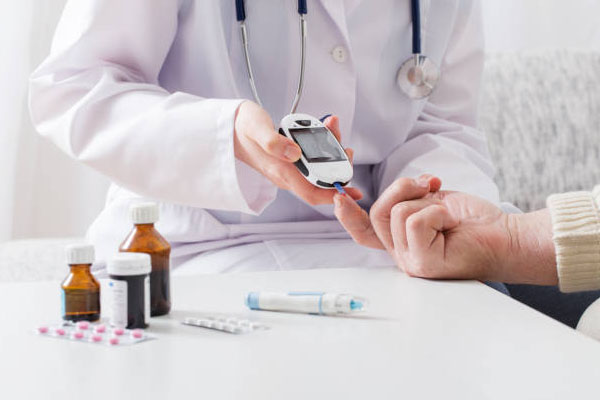What Are the Early Signs of Diabetes?
Explore the world of diabetes in our comprehensive guide Learn about the early signs, common risk factors, and effective management strategies for a healthier life with diabetes
Diabetes is a chronic health condition affecting millions of people worldwide. It is characterized by the body's inability to regulate blood sugar levels effectively. Understanding the early signs, risk factors, and the importance of timely diagnosis and management is crucial. In this article, we will delve into the world of diabetes, exploring its various facets, from the common risk factors to the subtle early signs that should not be ignored. Let's embark on a journey to comprehend the ins and outs of this condition and learn how to lead a healthy life with diabetes.

Understanding Early Signs of Diabetes
Diabetes is a chronic medical condition that affects how your body processes glucose (blood sugar). Early detection and management of diabetes are crucial for maintaining good health. In this section, we will explore the fundamental aspects of diabetes and its early warning signs.
What Is Diabetes?
Diabetes is a complex medical condition that affects how your body regulates blood sugar (glucose). Glucose is the primary source of energy for your cells. To enter your cells, glucose requires a hormone called insulin, which acts as a key. In diabetes, this process is disrupted, leading to elevated blood sugar levels.
There are several types of diabetes, but the most common ones are:
Type 1 Diabetes:
Type 1 diabetes is an autoimmune condition where the immune system mistakenly attacks and destroys the insulin-producing cells in the pancreas. This leads to an absolute lack of insulin in the body. It often develops in childhood or early adulthood and requires lifelong insulin therapy.
Type 2 Diabetes:
Type 2 diabetes is the more common form and typically develops in adulthood, although it's increasingly being diagnosed in children and adolescents. In this type, the body either doesn't produce enough insulin or becomes resistant to its effects. Lifestyle factors, such as poor diet and lack of exercise, can contribute to its development.
Diabetes is a serious condition that, if left unmanaged, can lead to a range of health complications, including heart disease, kidney problems, nerve damage, and more. Early diagnosis and proper management are key to living a healthy life with diabetes.
Common Risk Factors for Diabetes
Several factors can increase your risk of developing diabetes. Understanding these risk factors can help you take preventive measures and monitor your health. Common risk factors include:
1. Family History:
If you have a family history of diabetes, your risk of developing the condition is higher. Genetics can play a significant role in both Type 1 and Type 2 diabetes.
2. Obesity:
Being overweight or obese is a major risk factor for Type 2 diabetes. Excess body fat, particularly around the abdomen, can lead to insulin resistance, making it more challenging for the body to regulate blood sugar.
3. Sedentary Lifestyle:
Lack of physical activity is closely linked to Type 2 diabetes. Regular exercise helps your body use insulin more effectively and manage blood sugar levels. A sedentary lifestyle increases the risk of insulin resistance.
4. Poor Diet:
A diet high in unhealthy fats, sugar, and processed foods can contribute to diabetes. Consuming sugary drinks and an excessive amount of carbohydrates can lead to weight gain and insulin resistance.
5. Age:
The risk of Type 2 diabetes increases with age, especially after the age of 45. This risk is partly due to the natural aging process and lifestyle factors that accumulate over time.
6. Gestational Diabetes:
Women who have had gestational diabetes during pregnancy are at an increased risk of developing Type 2 diabetes later in life. It's essential for these individuals to have regular check-ups to monitor their blood sugar.
Understanding these common risk factors and addressing them through lifestyle changes, such as maintaining a healthy weight, staying physically active, and adopting a balanced diet, can help reduce the risk of developing diabetes.
Early Signs of Diabetes
Diabetes often presents with subtle but important early signs that should not be ignored. Recognizing these signs can lead to early diagnosis and effective management. Some common early signs of diabetes include:
1. Frequent Urination:
One of the most common early signs is an increased need to urinate, especially during the night. This occurs as the body attempts to eliminate excess glucose through urine.
2. Excessive Thirst:
Increased thirst often accompanies frequent urination. Dehydration from excess urination can make you feel very thirsty.
3. Unexplained Weight Loss:
If you're losing weight despite no changes in diet or activity, it could be a sign of diabetes. The body is losing sugar, which can result in weight loss.
4. Fatigue:
Feeling unusually tired or fatigued is another early sign. Your body's cells aren't getting the energy they need from glucose.
5. Blurred Vision:
High blood sugar levels can affect the lenses in your eyes, causing temporary changes in vision. This is often reversible with proper diabetes management.
6. Slow Wound Healing:
Cuts and sores that take longer to heal may be early signs of diabetes. Elevated blood sugar levels can affect the body's ability to repair itself.
It's important to note that these early signs can be subtle and may not always indicate diabetes. However, if you experience several of these symptoms, it's essential to consult a healthcare professional for a thorough evaluation and blood sugar testing. Early diagnosis and management are key to living well with diabetes.
Diabetes Diagnosis and Testing
Diagnosing diabetes involves various tests to determine blood sugar levels and the type of diabetes. The following are common diagnostic and testing methods:
1. Fasting Blood Sugar Test:
This test measures your blood sugar after an overnight fast. A fasting blood sugar level of 126 milligrams per deciliter (mg/dL) or higher indicates diabetes.
2. Hemoglobin A1c Test:
The hemoglobin A1c test provides a long-term average of your blood sugar levels. An A1c level of 6.5% or higher is indicative of diabetes.
3. Oral Glucose Tolerance Test (OGTT):
In an OGTT, your blood sugar is measured after fasting and then again two hours after drinking a sugary solution. A blood sugar level of 200 mg/dL or higher two hours after the test suggests diabetes.
4. Random Blood Sugar Test:
This test is performed at any time and doesn't require fasting. A blood sugar level of 200 mg/dL or higher may indicate diabetes if accompanied by typical symptoms.
5. Antibody Tests (Type 1 Diabetes):
For those suspected of having Type 1 diabetes, antibody tests can identify specific antibodies that attack the insulin-producing cells in the pancreas.
6. C-Peptide Test:
This test measures the amount of c-peptide, a byproduct of insulin production. It can help distinguish between Type 1 and Type 2 diabetes and assess the body's insulin production.
If you experience symptoms or have risk factors for diabetes, it's essential to consult a healthcare professional for appropriate testing. Early diagnosis and proper management are critical for effectively controlling diabetes and minimizing complications.
Managing Diabetes
Once diagnosed with diabetes, effective management is essential to maintain your health and well-being. Diabetes management includes the following key aspects:
1. Blood Sugar Monitoring:
Regular monitoring of your blood sugar levels is critical. This helps you understand how your diet, physical activity, and medication affect your blood sugar and allows for timely adjustments.
2. Medication:
Depending on the type and severity of diabetes, your healthcare provider may prescribe oral medications, insulin, or other injectable medications to help regulate blood sugar levels.
3. Healthy Eating:
A balanced diet is a cornerstone of diabetes management. Focus on portion control, choosing foods with a low glycemic index, and incorporating a variety of nutrient-rich foods into your meals.
4. Regular Physical Activity:
Physical activity is essential for managing blood sugar levels. Aim for at least 150 minutes of moderate-intensity aerobic exercise per week, along with strength training activities.
5. Stress Management:
Stress can affect blood sugar levels. Learn stress management techniques like deep breathing, meditation, or yoga to keep stress in check.
6. Regular Healthcare Check-ups:
Regular visits to your healthcare provider are crucial for monitoring your condition and addressing any potential complications or concerns.
7. Education and Support:
Diabetes education and support are invaluable. Joining support groups, working with a registered dietitian, and receiving diabetes education can provide guidance and motivation.
Effective diabetes management helps individuals lead healthy and fulfilling lives. By actively participating in your care and working closely with your healthcare team, you can keep your diabetes well-controlled and reduce the risk of complications.
Q&A: Exploring Diabetes Warning Signs
Q1: What are the risk factors for developing diabetes?
A1: Common risk factors for diabetes include family history, obesity, a sedentary lifestyle, poor diet, age, and a history of gestational diabetes in women. Identifying these risk factors is crucial for preventive measures.
Q2: What are the early signs of diabetes that I should watch out for?
A2: Early signs of diabetes may include frequent urination, excessive thirst, unexplained weight loss, fatigue, blurred vision, and slow wound healing. Recognizing these signs can lead to early diagnosis and effective management.
Q3: How is diabetes diagnosed and what tests are used?
A3: Diabetes is diagnosed through various tests, including fasting blood sugar tests, hemoglobin A1c tests, oral glucose tolerance tests (OGTT), random blood sugar tests, antibody tests (for Type 1 diabetes), and c-peptide tests. Healthcare professionals use these tests to determine blood sugar levels and the type of diabetes.
Q4: What are the key components of diabetes management?
A4: Diabetes management involves blood sugar monitoring, medication as prescribed, maintaining a balanced diet, engaging in regular physical activity, managing stress, attending regular healthcare check-ups, and seeking diabetes education and support for guidance and motivation.
Q5: How important is early diagnosis and management in living with diabetes?
A5: Early diagnosis and management are critical in living well with diabetes. They allow for effective control of blood sugar levels and minimize the risk of complications, ensuring a healthier and fulfilling life despite the condition.
